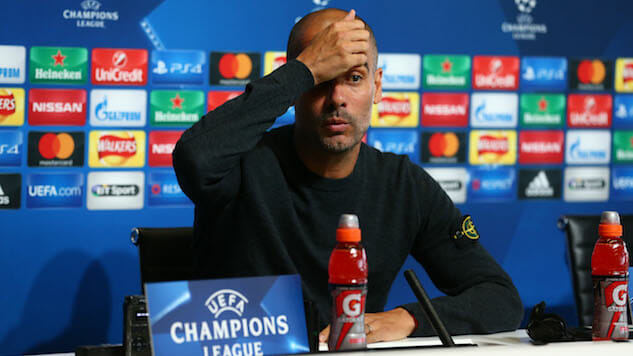In Defence of ‘Dumb’ Questions at Managerial Press Conferences
Photo by Dave Thompson/Getty
In order to keep up with what seems like an avalanche of soccer news content which dwarfs the game itself, I use an old timey RSS Feed reader. On it are several smaller blogs and niche sites, but I also maintain a separate folder for more traditional football news sources like ESPNFC, the Daily Mail, the Independent, the Guardian.
It doesn’t take long for these sites to fill up my reader to its 5,000 story limit; they literally pump out hundreds of football-related stories a day. Most of these are entirely what you would expect; so-and-so player believes his club is bound to show a turnaround in form, there are rumours this other player is planning to move to this club in this other league, etc. etc.
But there is also a lot of managerial boilerplate—managers telling reporters we don’t expect this inferior team to be a pushover, that the referee was wrong about this or that call, they they think their club is a strong contender to stay up. I don’t have access to the internal web metrics on these stories, but I suspect readership is not particularly high.
That’s not to say they don’t serve a vital purpose beyond that of “informing” the reader. The Internet is a giant content hole and content providers need to fill it. One of the easiest ways to do it is to sit in a press conference, ask a question, record the answer, and file away.
No one is at fault here. These sites run on clicks from people like you and me, and one way to get a lot of them is to produce a wall of content, hoping some of it will stick while also giving readers a reason to keep coming back every 15 minutes.
Meanwhile club managers are obligated to sit in front of the press and answer questions, with the understanding they will never say anything revealing or genuinely interesting. Though everyone dreams of a Mike Bassett-like moment of clarity, the truth is press conferences in football are almost always rote as fuck. This does not leave reporters much of a journalistic palette to work with.
And so, in an attempt to get something, anything beyond the usual pablum, some push a little and shoot for the moon with silly but provocative questions.
-

-

-

-

-

-

-

-

-

-

-

-

-

-

-

-

-

-

-

-

-

-

-

-

-

-

-

-

-

-

-

-

-

-

-

-

-

-

-

-








































